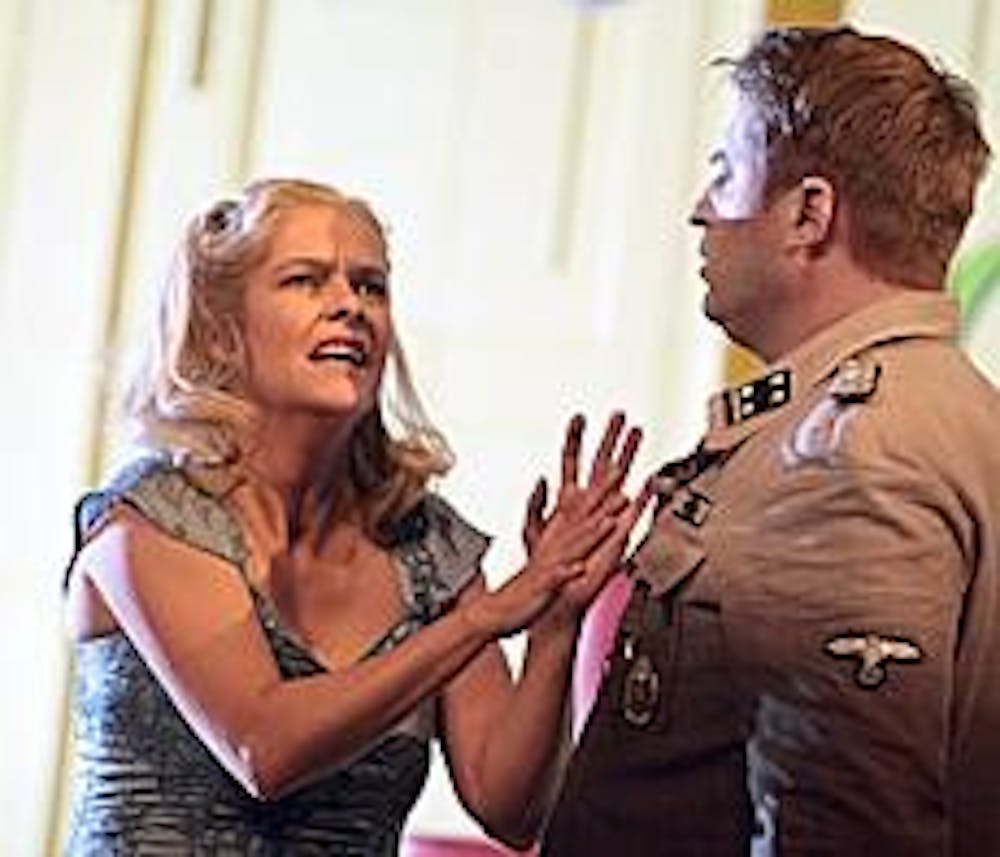There is a scene in Nicholas Maw's opera "Sophie's Choice" where schizophrenic Nathan Landau (Scott Hendricks) assures the title character in his most comforting baritone, "Please, just let Nathan take charge, this is my show." He's not kidding.
Hendricks commanded the Opera House stage last Monday at the Kennedy Center for the Performing Arts, as the Washington National Opera performed "Sophie's Choice," the tragic story of a Holocaust survivor in post-war Brooklyn, for the sixth and final time.
Maw's libretto is based on the best-selling novel by William Styron. It tells the story of Sophie Zawistowska (played by Angelika Kirchschlager), a racially pure Polish woman who survives Auschwitz only to be consumed by memories of her murdered children. After relocating to Brooklyn, Sophie falls violently in love with Nathan, whose mood swings only drive her further into madness and grief. A southern writer, Stingo (Gordon Grietz), narrates Nathan and Sophie's fatal love affair.
At least, that's what's supposed to happen. Kirchschlager, who reprises her role from the London debut in 2002, plays Sophie as a maudlin wreck spending more time sprawled across the stage than she does expressing the intense emotion of her arias. Hendricks drowns out her mezzo-soprano in duets, and the orchestra does the same during her solos.
Grietz also falters with his vocal performance. A booming tenor, Grietz gives a passion to Stingo that stands at odds with the boyish way he acts the part. But it is the Southern accent that comes through intermittently that really holds him back. The true horror of it is something that must be heard to be fully understood.
The most powerful note in the opera is the only one that isn't sung. Sophie must choose which of her two children will be executed immediately upon their arrival at Auschwitz. Sophie's daughter, being dragged away by a Nazi officer into the blackness surrounding the spotlight, lets out a haunting scream that reverberates in the silence of the Opera House.
Dale Duesing plays the narrator who communicates Sophie's story throughout the opera. This creates a story within a story, as Sophie's own history is told through a series of flashbacks to her childhood in Krakow, war-era Warsaw and finally her internment at Auschwitz. What could be a chronologically convoluted story is centralized around set designer Robert Schweer's minimalist set. A raised platform serves as an anchor for the post-war drama in Brooklyn, while Sophie and the narrator wander around the empty stage for their divergent flashbacks. By the fourth act, the platform fragments into four pieces, representing Sophie's shattered mind.
A massive canopy of photographs of unnamed Holocaust victims dwarves the set, providing a visual to the way the memories of the war hang over Sophie's head. During the closing notes of the opera, these photographs rise up above the curtain. This is the most delicate scene of the performance and makes one wonder whether the rest is just crass.
While the Holocaust certainly has all the necessary elements of tragedy to be memorialized as opera, "Sophie's Choice," in all of its dark humor and southern drawl, seems at times to trivialize the subject. Regardless, it poses the question of whether or not the art world is ready to fictionalize such a poignant and emotional event. In the case of "Sophie's Choice," one would be better suited to rent the film.





